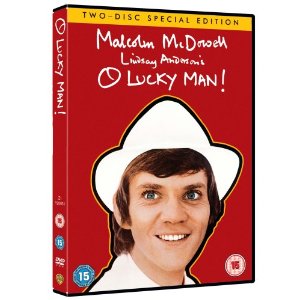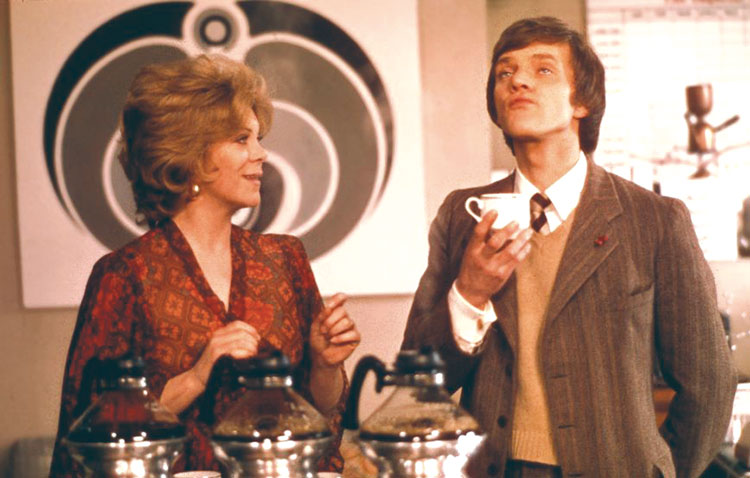Feature
You Ain't Seen Me, Right? - O Lucky Man! (1973)
Movie Feature
Daniel
23rd September 2011
Welcome to another edition of You Ain’t Seen Me, Right?, the weekly feature that throws aside its copy of Halliwell’s Movies That Matter saying “Ha! I re-write you!” .
You Ain't Seen Me, Right? is brought to you by Daniel Palmer, of Part-Time Infidel web fame. He’s what happened when Harry met Sally.
Buy the DVD on Amazon

Lindsay Anderson emerged from the stark social realism of the British New Wave to become one of the country’s most daring and diverse cinematic voices. His debut film, This Sporting Life (1963), is one of the purest expressions of the adventurism and pluralism that gripped British cinema, featuring a career-defining central performance from Richard Harris. Next was If... (1968); a mordant satire of the public school system that encapsulated the growing mood of disenchantment amongst the world’s youth. O Lucky Man! is the second of a trilogy that includes If... and Britannia Hospital (1982), with Malcolm McDowell as their hero, Mick Travis.
Fresh from his first-rate education, Travis takes a job with Imperial Coffee, which exports Nigerian coffee back to Nigeria. When one of their salesmen goes AWOL, Travis assumes responsibility for sales in the North-East. This sudden promotion sets Travis on a journey through a country coming to terms with its fall from imperial grace, driven by internal unrest and gripped by Cold War paranoia; Travis rationalising any obstacle to what he believes is his illustrious destiny.

McDowell was clearly off his tits during most of the filming.
Anderson was amongst the first exponents of the ‘meta’ form that has since become a convention, presenting a version of reality informed by movies and a Dadaist streak, harnessing various Brechtian distancing techniques. This impulse reached its apotheosis with O Lucky Man!: a ribald, picaresque parable of ambition that levels its satirical sword at science, religion, commerce, politics and the military with equal vigour. Miroslav Ondrícek’s hazy photography accentuates the fantastical nature of this allegorical landscape, while the sound design adds texture and provides context. The narrative is broken up by scenes of Alan Price performing songs from the soundtrack, the former member of The Animals offering a précis of the film’s conceptual concerns.
Many of the characters from If... recur, part of a repertory that plays multiple roles: this decision may have been more fiscally than artistically motivated; the famous story goes that the decision to shoot If... in both black and white and colour - heralded as an act of creative bravery - was simply a matter of the budget not extending to enough colour stock. The cast is a mix of familiar faces from British TV - Arthur Lowe, Dandy Nichols, Warren Clarke, Geoffrey Palmer, Bill Owen, James Bolam, et al. - and venerable names from the stage, which provides a pleasing disparity. Mick is a ruthless, cunning outsider, a pilgrim possessing unassailable reserves of self-belief; he is able to fake his way into the upper echelon of the establishment and overcome everyday corruption on empty charisma alone. It is a role for which a young McDowell was tailor made.
O Lucky Man! is a film unlike any other, displaying a visual and structural audacity beyond the ken of most directors, a lasting testament to Anderson’s unique vision. Like Mick, Anderson had a gift for getting under the skin of society, from the Old Boys’ Network to hoi polloi; puncturing the veneer of probity and plunging into the mire of turpitude that bubbles beneath it all.

Follow us on Twitter @The_Shiznit for more fun features, film reviews and occasional commentary on what the best type of crisps are.
We are using Patreon to cover our hosting fees. So please consider chucking a few digital pennies our way by clicking on this link. Thanks!
Support Us
Follow Us
Recent Highlights
-
Review: Jackass Forever is a healing balm for our bee-stung ballsack world
Movie Review
-
Review: Black Widow adds shades of grey to the most interesting Avenger
Movie Review
-
Review: Fast & Furious 9 is a bloodless blockbuster Scalextric
Movie Review
-
Review: Wonder Woman 1984 is here to remind you about idiot nonsense cinema
Movie Review
-
Review: Borat Subsequent Moviefilm arrives on time, but is it too little, or too much?
Movie Review
Advertisement
And The Rest
-
Review: The Creator is high-end, low-tech sci-fi with middling ambitions
Movie Review
-
Review: The Devil All The Time explores the root of good ol' American evil
Movie Review
-
Review: I'm Thinking Of Ending Things is Kaufman at his most alienating
Movie Review
-
Review: The Babysitter: Killer Queen is a sequel that's stuck in the past
Movie Review
-
Review: The Peanut Butter Falcon is more than a silly nammm peanut butter
Movie Review
-
Face The Music: The Bill & Ted's Bogus Journey soundtrack is most outstanding
Movie Feature
-
Review: Tenet once again shows that Christopher Nolan is ahead of his time
Movie Review
-
Review: Project Power hits the right beats but offers nothing new
Movie Review
-
Marvel's Cine-CHAT-ic Universe: Captain America: Civil War (2016)
Movie Feature
-
Review: Host is a techno-horror that dials up the scares
Movie Review
